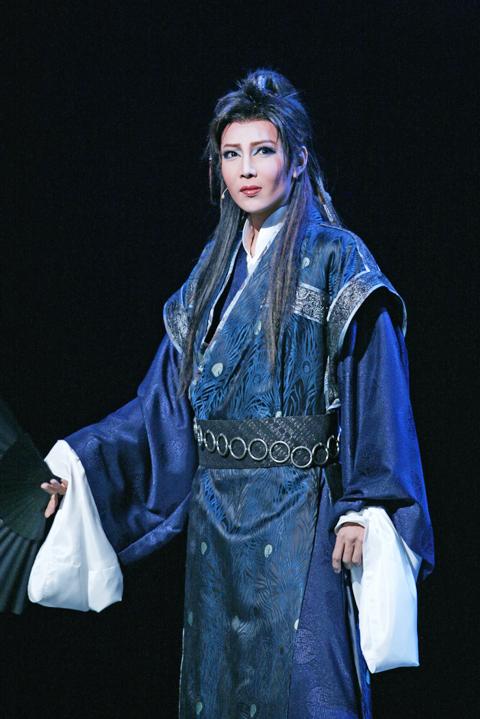A glittering array of performers parade down a grandiose stage-wide staircase attired in sumptuous plumes of ostrich feathers and sequined costumes. Bathed in the sparkling light of a mirror ball, they sing and dance and are nothing short of, well... camp.
This is a stage show by Japan’s Takarazuka Revue. Founded 99 years ago by railroad tycoon Ichizo Kobayashi in the city of Takarazuka, the theater company is famous for its lavish, Broadway-style productions in which all men’s parts are played by the otokoyaku, a type of actress who specializes in playing male roles.
With much anticipation, the all-female musical theater troupe makes its debut appearance in Taiwan with 12 sold-out shows that run through Sunday at the National Theater (國家戲劇院) in Taipei. Divided into three parts, the 190-minute production features 40 performers from Takarazuka’s Star Troupe, led by Reon Yuzuki, who joined the company in 1999 and become one of its top stars after 10 years of perfecting her skills in performing in masculine form.

Photo Courtesy of Kuang Hong Arts
Yuzuki said she has studied and imitated the posture of men both on and off the stage, and in order not to disappoint her fans, has never been seen in skirts in public since entering the company.
The star of Takarazuka’s show is always a male role. Otokoyaku players garner admiration for the handsome gentleman characters they portray in productions that fall into the category of romantic melodrama. Indeed, it is no surprise that women constitute the majority of the troupe’s annual audiences of two and half million in Japan.
Some attribute the appeal to the female audience to its lesbian overtones; others believe the practice of otokoyaku is meant to undermine stereotypical gender roles. And if the troupe’s three-hour long rehearsal at the National Theater last Saturday is any indication, the almost century-old theater company does seem to have great fun playing with the conventional notions of gender and sexuality, consciously or not.

Photo Courtesy of Kuang Hong Arts
An eloquent example can be found in the show’s grand finale. Wearing flamboyant featured back-pieces and fur stoles, the otokoyaku stars strut down the staircase, dancing seductively. The performers’ short-cropped hair, baritone voices and gallant walk may appear masculine, but their lithe bodies and fine features exude feminine eroticism rather than masculine sexuality.
An androgynous character appears at one point, with half of her body dressed in black suit and half in white gown. Another climax comes when Yuzuki engages with another otokoyaku player in a battle scene charged with homoerotic tension.
It is commonly said that the original goal of Takarazuka is to make good wives and mothers out of the actresses who have to leave the company once married. But a glimpse of the show suggests the opposite. With its androgynous otokoyakus in flamboyant costume, the Japanese spectacle is more of a queer’s carnival than a work of wholesome entertainment for the whole family.

On April 26, The Lancet published a letter from two doctors at Taichung-based China Medical University Hospital (CMUH) warning that “Taiwan’s Health Care System is on the Brink of Collapse.” The authors said that “Years of policy inaction and mismanagement of resources have led to the National Health Insurance system operating under unsustainable conditions.” The pushback was immediate. Errors in the paper were quickly identified and publicized, to discredit the authors (the hospital apologized). CNA reported that CMUH said the letter described Taiwan in 2021 as having 62 nurses per 10,000 people, when the correct number was 78 nurses per 10,000

As we live longer, our risk of cognitive impairment is increasing. How can we delay the onset of symptoms? Do we have to give up every indulgence or can small changes make a difference? We asked neurologists for tips on how to keep our brains healthy for life. TAKE CARE OF YOUR HEALTH “All of the sensible things that apply to bodily health apply to brain health,” says Suzanne O’Sullivan, a consultant in neurology at the National Hospital for Neurology and Neurosurgery in London, and the author of The Age of Diagnosis. “When you’re 20, you can get away with absolute

When the South Vietnamese capital of Saigon fell to the North Vietnamese forces 50 years ago this week, it prompted a mass exodus of some 2 million people — hundreds of thousands fleeing perilously on small boats across open water to escape the communist regime. Many ultimately settled in Southern California’s Orange County in an area now known as “Little Saigon,” not far from Marine Corps Base Camp Pendleton, where the first refugees were airlifted upon reaching the US. The diaspora now also has significant populations in Virginia, Texas and Washington state, as well as in countries including France and Australia.

May 5 to May 11 What started out as friction between Taiwanese students at Taichung First High School and a Japanese head cook escalated dramatically over the first two weeks of May 1927. It began on April 30 when the cook’s wife knew that lotus starch used in that night’s dinner had rat feces in it, but failed to inform staff until the meal was already prepared. The students believed that her silence was intentional, and filed a complaint. The school’s Japanese administrators sided with the cook’s family, dismissing the students as troublemakers and clamping down on their freedoms — with